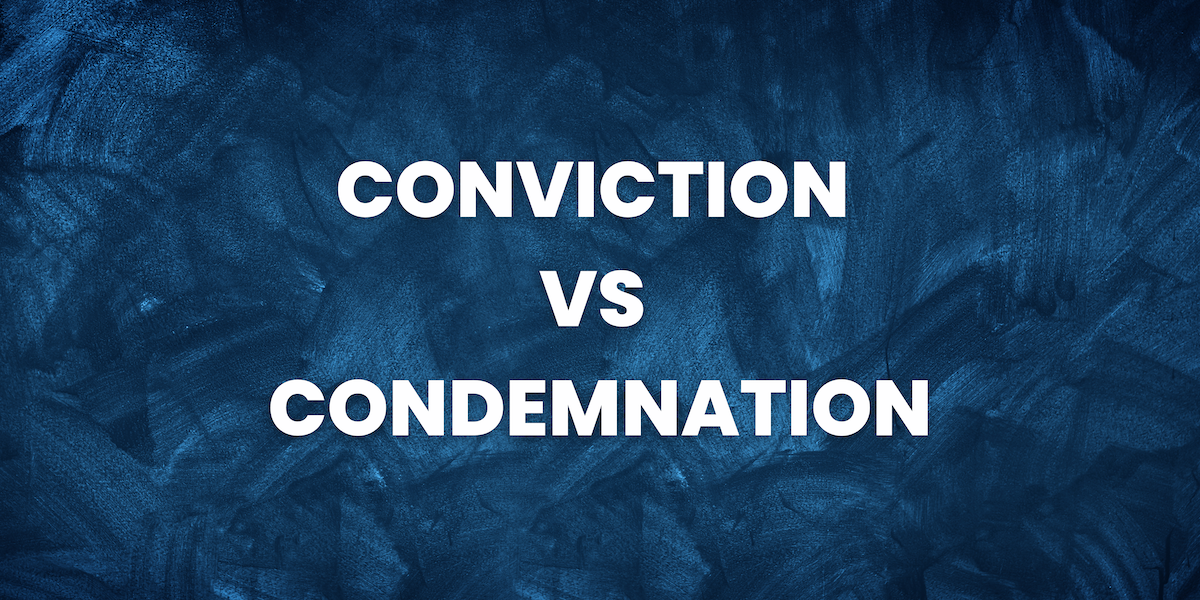In our spiritual journey, it is essential to understand the difference between conviction and condemnation. While they may sometimes appear similar, and even be used interchangeably, they carry distinct meanings and implications in a Biblical context. I want to shed light on these two profoundly different spiritual experiences and lead us to a clearer understanding of the differences between conviction and condemnation, and how they relate to our spiritual growth and relationship with God. What is the difference between conviction and condemnation?
Conviction: A Call to Repentance and Transformation
Conviction, in a Christian context, refers to the work of the Holy Spirit in our hearts and minds. It is a deep inner awareness prompted by the Holy Spirit. When the Holy Spirit convicts us, He exposes our thoughts, actions, and attitudes that are not aligned with God’s truth, righteousness, and will. It is rooted in God’s mercy and grace, as He desires our spiritual growth and desires to draw us closer to Him. Conviction is God’s means of transforming us into the likeness of Christ.
The Purpose of Conviction
- Awareness of Sin: Conviction brings to light our sinful nature and reveals areas in our lives that fall short of God’s standards (Romans 3:23). It helps us recognize sin for what it truly is—an offense against God. Conviction is an invitation to humbly acknowledge our shortcomings and recognize our need for repentance and God’s forgiveness.
- Guidance towards Repentance: Conviction serves as a catalyst for personal growth and spiritual maturity. It leads us to repentance, realizing our need to turn away from sinful behaviors and attitudes and turn towards God’s righteousness (Acts 3:19). It is an opportunity for reconciliation with Him and a fresh start in our spiritual journey.
- Restores Our Relationship with God: Conviction paves the way for restoration of our fellowship with God. When we acknowledge our sins, seek His forgiveness, and embrace His transforming grace, we experience God’s love and the power of His Spirit working within us. As a result, conviction fosters deeper intimacy with God. When we respond to His gentle correction, we draw near to Him, allowing His presence to guide and shape our lives.
Our Response to Conviction
- Repentance: Acknowledge the revealed sin and turn away from it, seeking God’s forgiveness and guidance.
- Embrace God’s Grace: Recognize that conviction comes from a place of love, mercy, and grace. Trust in God’s willingness to forgive and restore you through the sacrifice of Jesus Christ.
Condemnation: The Accuser’s Strategy
On the other hand, condemnation is not from God but originates from our accuser, Satan. Its purpose is to separate us from God’s love, burden us with guilt and shame, and hinder our spiritual growth. Unlike conviction, condemnation is destructive and has no redemptive purpose. It aims to push us away from God and paralyze our faith.
Identifying Condemnation
- False Accusations: Condemnation bombards us with relentless accusations, reminding us of our past sins, failures, and shortcomings. It seeks to distort our perception of God’s character, making us doubt His forgiveness and love (Revelation 12:10).
- Hopelessness: Condemnation leaves us feeling hopeless, unable to see a way forward or believe in God’s mercy. It keeps us trapped in guilt and shame, making us feel unworthy of God’s grace and incapable of experiencing His transforming power. Condemnation hinders our spiritual growth and prevents us from living in the freedom that Christ has granted us (Romans 8:1).
- Separation from God: Condemnation seeks to sever our connection with God, convincing us that we are too broken to be in His presence. It drives a wedge between God and us, convincing us that we are irredeemable. Condemnation distorts our perception of God’s character, making it challenging to experience His love and the life-giving relationship He desires with us (John 3:17).
Overcoming Condemnation
- Recognize its Source: Understand that condemnation is not from God but from the enemy. Satan wants to undermine our faith and prevent us from experiencing the abundant life God has planned for us.
- Embrace God’s Truth: Counter the lies of condemnation with the truth of God’s Word. Meditate on His promises, affirming your identity as a beloved child of God, forgiven and redeemed through Jesus Christ.
- Live in Community: Surround yourself with a community of believers who can offer encouragement, accountability, and prayer. Share your struggles with trusted individuals who can remind you of God’s unfailing love.
While conviction and condemnation may seem similar at first glance, they have fundamentally different origins, purposes, and outcomes. Conviction, driven by the Holy Spirit, leads us towards God’s transforming grace, allowing us to grow in sanctification and experience the depth of His love. Condemnation, on the other hand, originates from the accuser, seeking to separate us from God’s forgiveness and burdening us with guilt and shame.
As followers of Christ, we must discern between conviction and condemnation. Embracing conviction enables us to humbly receive God’s grace, repent, and grow in our faith. At the same time, we must reject condemnation, choosing to focus on God’s truth and the freedom that comes from being forgiven and reconciled.
When faced with feelings of guilt and shame, let us remember that God is a compassionate and forgiving Father who longs for our restoration. By seeking His truth and understanding the difference between conviction and condemnation, we can live in the fullness of His grace, growing closer to Him each day.
Related
